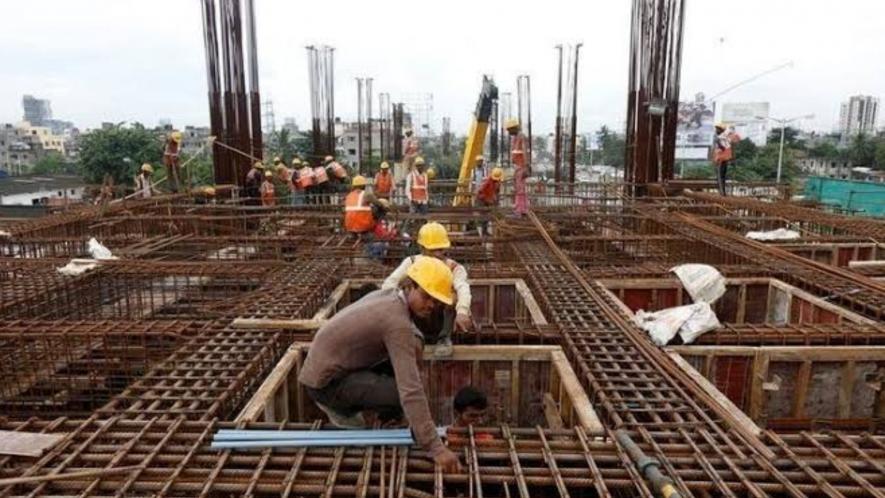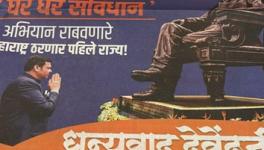Informal Workers Stage National Protest for Labour Rights

New Delhi: Thousands of informal workers representing various sectors of the unorganised workforce converged outside the Parliament on February 7, demanding comprehensive legal protections and labour rights. Following yesterday’s national protest, similar demonstrations are scheduled to take place at the state level from February 8th to 15th, with the aim of presenting core demands to state governments and political parties ahead of the elections.
The ongoing protest, organised by the Working Group on Legal Protection of Informal Workers, is witnessing participation from a wide array of trades, including construction, agriculture, domestic work, fisheries, and more.
Expressing dismay over the absence of budgetary allocation for social security in the recently presented Union Budget, the workers voiced their grievances during the Budget session of Parliament. The demonstration, strategically timed ahead of the forthcoming National Elections, aimed to draw attention to the plight of over 90% of India's workforce, contributing over 50% to the country's Gross Domestic Product (GDP).
The workers presented a list of core demands to the Parliament, the Government, and the President of India, calling for urgent legislative measures to safeguard their rights. These demands include compulsory registration of workers and unions, collective bargaining rights, and a guaranteed minimum wage based on established norms.
Among the demands were provisions for occupational health and safety, recognition of women workers, and the establishment of sectoral welfare boards empowered to address the welfare needs of workers. The workers also emphasised the need for social security measures, including a monthly pension and housing provisions.
The protest highlights the erosion of labour rights due to recent labour code reforms by the Central Government, which have dismantled sectoral protections for informal workers. The workers have also called for the withdrawal of these labour codes and the restoration of sectoral laws to ensure adequate safeguards.
In solidarity with other labour movements, the informal workers pledged their support to the struggles of central trade unions, truck drivers' unions, and farmers' unions. They have announced their support for a nationwide hartal scheduled for February 16, 2024.
Read the Full Statement Below:
Informal Workers Demand Labour Rights & Protections
A National Dharna of unorganised sector workers has been organised before the Parliament on 7 Feb 2024 by the Working Group on Legal Protection of Informal Workers consisting of SEWA, NCC CL, NCL, NFUMW and Representatives of trade unions of unorganised workers belonging to Construction, Agriculture, Domestic, Fisheries, Forests, Handlooms and Powerlooms, Pottery, Dhobi, Hairdressers, Tailoring, Loaders, Street vendors, and various trades and occupations in different parts of the country have participated in this Dharna during the Budget session of Parliament and in view of the forthcoming National Elections. A delegation will present Memoranda to Parliament, the Government and the President of India the Core Labour Demands of Informal workers. We are indeed shocked that no money has been allotted in the Budget presented by Union Govt fro Social security of Unorganised workers.
State level Dharnas will also be held from 8th to 15th Feb and our Core Demands presented to state governments and to political parties for inclusion in their election manifestos.
Informal workers constitute more than 90 per cent of India’s workers and contribute more than 50 per cent of the country’s GDP. Yet India’s labour laws provide very little protection for the mass of workers. Instead, the few, limited, hard won sectoral laws for informal workers have been done away through the infamous Labour Codes introduced by the Central Government.
The Constitution of India mandates the State to ensure labour rights and social security of all working people. India has declared its commitment to the Fundamental Principles and Rights at Work of the International Labour Organisation. It is time to implement these promises.
As trade unions and organisations of informal workers we urge all political parties to include in election manifestos the following concrete proposals to protect the labour rights and social security of informal workers:
Core Labour Demands
1. A Comprehensive Law for Informal Workers extending Core Labour Standards to all segments of workers – wage labour, self-employed, workers on commons, migrants and platform workers. Such legislation must cover besides other important rights
a) • Compulsory Registration of workers and their unions
• Compulsory recognition to unions chosen by workers through secret ballot
• Collective Bargaining Right
• Grievance Redressal & Dispute Resolution mechanisms
b) the working day to be a maximum of 8 hours and/or 48 hours a week with double the rate of wages for overtime and one weekly off
c) Guaranteed minimum wage calculated on the basis of the 15th Indian Labour Conference norms and Supreme Court judgments.
d) A minimum guaranteed income or MSP for the products of the self-employed.
e) Occupational Health and Safety of unorganized sector workers, with Safety measures and lists of Occupational Diseases for each major sector, besides provision of Health card and annual health checkup.
f) Equal pay for equal work should be restored and women workers in all sectors should be
recognized as workers, even for family labour at specific worksites as in construction, brick kilns and harvesting of some crops.
g) Sectoral Welfare Boards empowered to collect sectoral Levy of 1% to meet welfare needs.
h) Sexual Harassment complaints committees at ward, local bodies and district levels.
2. Social security must be ensured for every registered worker including ESI and a Monthly Pension of not less than Rs 5000. Adequate provisions must be made for Housing. Funds must be allocated for Social Security, with 3% of Central and State budgets reserved for this purpose, as recommended by the Lok Sabha Standing Committee on Labour, 2008 as well as 1% of GST and 2% special tax on the super rich. The welfare needs of sectoral workers must be met through Sectoral Welfare Boards funded through a 1% sectoral Levy.
3. A Migrant Labour Action Plan must be mandated by law, with provisions for compulsory registration, dry rations, child care, health care and children's education, for all registered migrant workers.
4. Agricultural workers and small farmers, who comprise the biggest segment of informal workers, must be ensured a living wage, social security and minimum guarantee of income. Their working day should be 6 hours, with a break during the peak hot days. The Land Rights of this section must be recognised and they must be compensated in case of displacement and job loss.
5. Rights to natural resources for livelihood should be ensured. Existing provisions for workers who live off these resources, such as forest dwellers, fish workers, salt pan workers and potters, should be strengthened. They need special protections under labour law.
6. A special law covering home based workers must be enacted to ensure minimum guarantee of income, dispute resolution, social security, etc
7. Comprehensive legislation for regulation of employment, working conditions, provision of Social Security and protection from sexual harassment must be enacted for Domestic Workers.
8. Annual Survey of Bonded Labour and Child Labour as well as Action Plans for Release and Rehabilitation of these sections.
9. Withdrawal of Labour Codes and restoration of sectoral laws including the two Building & Other Construction Workers (BOCW) Acts, the Plantation Labour Act, the Motor Transport Workers Act and the Beedi and Salt workers’ Welfare Cesses and Welfare Schemes.
10. Employment Guarantee for 200 days in rural and urban areas.
11. Existing State level laws and multiple Welfare Boards in Tamil Nadu, Kerala, Maharashtra and other states should be protected, instead of being subsumed under the less beneficial Central laws and Labour Codes.
While raising these demands we also express our complete support to the struggles of the Central Trade Unions, the truck drivers’ trade unions and the Samyukta Kisan Morcha which comprises unions of farmers and peasants. We support the Central Trade Unions Call for a Nationwide Hartal on 16th Feb 2024.
We pledge to uphold the basic features of the Constitution that guarantee Equality, Fraternity, Secularism, Socialism, and Cooperative Federalism, especially in matters concerning Labour. We reject the ill-advised ideology of neoliberalism which promotes “Flexible Labour” in the name of “Ease of doing business” and erodes Labour Rights and Labour Jurisprudence based on the values of the Constitution.
Get the latest reports & analysis with people's perspective on Protests, movements & deep analytical videos, discussions of the current affairs in your Telegram app. Subscribe to NewsClick's Telegram channel & get Real-Time updates on stories, as they get published on our website.
























